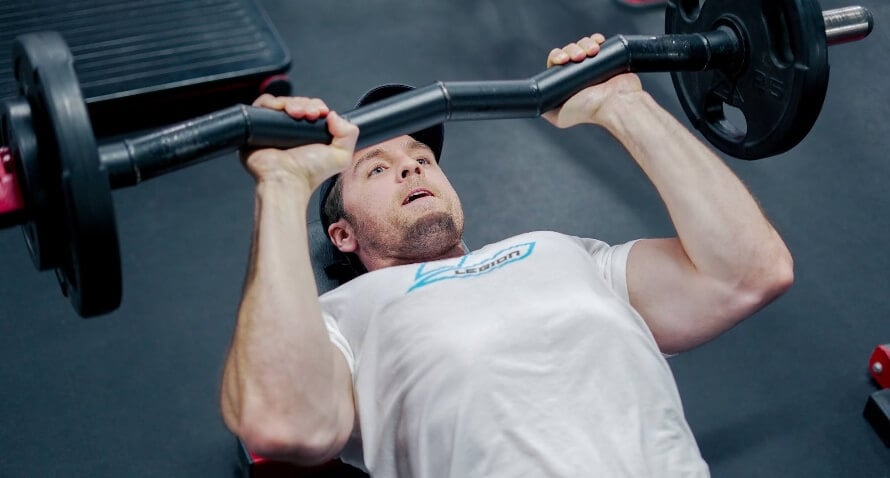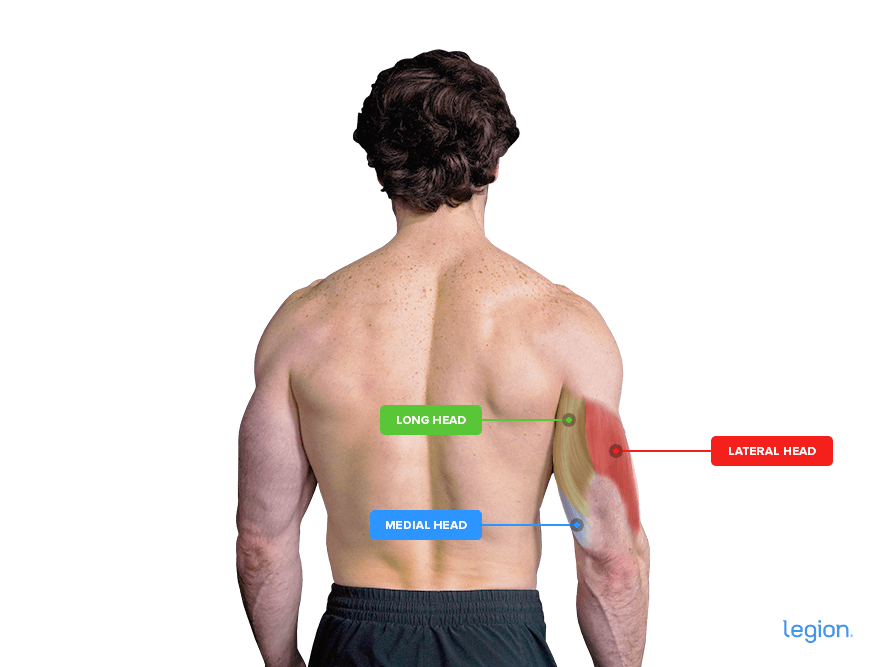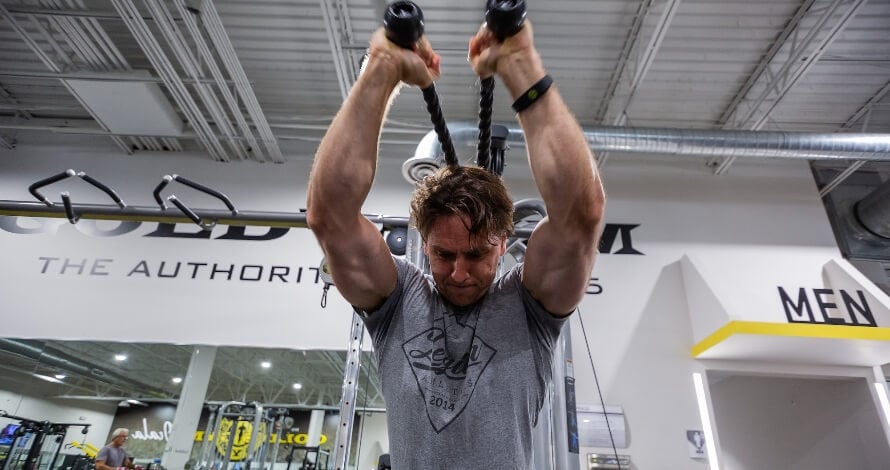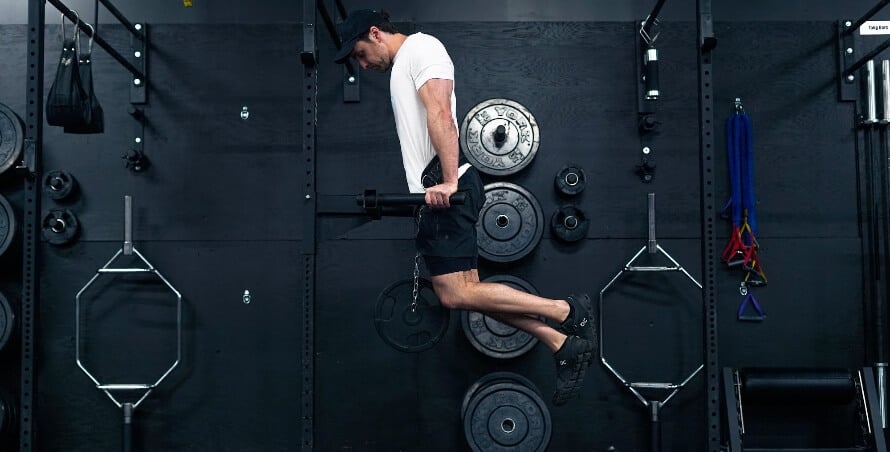There are thousands of “best tricep workout” articles online, but most recommend ineffective exercises that won’t help you build the “horseshoe” triceps you want.
So, what actually works?
First, you need to understand that your triceps have three distinct “heads,” and each requires specific exercises to reach its full potential.
Then, you need to know which exercises train each head most effectively and how to organize them into routines that deliver real results.
This article has all the answers.
In it, you’ll learn how triceps anatomy impacts your training, discover the best exercises for targeting each triceps head, and get the best triceps routine for building upper arm mass.
Key Takeaways
- To build horseshoe triceps, you must do exercises that train all three heads of the triceps: the long head, medial head, and lateral head.
- While you can never completely isolate any head of the triceps, some exercises emphasize one head more than the others.
- Generally speaking, overhead triceps exercises emphasize the long head, pressing exercises target the medial head, and exercises where your upper arms are close to your sides are most effective for training the lateral head.
- The best triceps exercises for mass are the close-grip bench press, dip, dumbbell overhead triceps extension, JM press, skull crusher, triceps pushdown, cable triceps kickback, and diamond push-up.
- The best triceps routines encourage you to train 1-to-2 reps shy of failure and prioritize progressive overload (lifting heavier weights over time).
Triceps Anatomy

The triceps brachii, or “triceps,” is the muscle group located on the back of the upper arm, between the shoulder and elbow.
It has three sections or “heads:”
- Lateral head: The lateral head is the strongest head of the triceps. It’s on the outside of your upper arm, so it’s the most visible when your arms are at your sides.
- Medial head: The medial head of the triceps is hidden deep in your arm, so it’s the least visible triceps head.
- Long head: The long head runs along the inside of your arm. It’s the largest part of the triceps, so it contributes most to the arm’s bulk.
When you develop all three heads, they create a horseshoe-like shape like this:

What Exercises Work the Different Triceps Heads?
You can’t completely isolate one triceps head—all three contribute to elbow extension, so any exercise that involves straightening your arms will train all three heads of your triceps.
In other words, heavy pressing and dipping will go a long way in building those horseshoe triceps.
That said, research shows some exercises “emphasize” one head more than the others. This matters because if one of your triceps heads is lagging, targeting it can help you add size where you need it.
Let’s break down which exercises emphasize each triceps head to ensure you get a full triceps workout.
What Exercises Target the Long Head of the Triceps?
Research shows that the long head benefits most from exercises that place your arms overhead. These exercises are particularly effective because they stretch the long head, and training a muscle while stretched often benefits growth.
The best exercises for emphasizing the long head are:
- Dumbbell overhead triceps extension
- Cable overhead triceps extension
- Cable pullover
What Exercises Target the Medial Head of the Triceps?
Research shows that the medial head of the triceps is most active when your upper arms are perpendicular to your torso, as they are during exercises like presses and skull crushers.
The best exercises for training the medial head are:
- Close-grip bench press
- JM press
- Skullcrusher
What Exercises Target the Lateral Head of the Triceps?
Studies show that the lateral head of the triceps is most active when your upper arms are close to your sides.
The best exercises for targeting the lateral head of the triceps are:
- Dip
- Triceps pushdown
- Cable kickback
The Best Triceps Exercises for a Full Triceps Workout

The following exercises are for all your triceps heads, so they’re all you need to build big, strong, horseshoe triceps
Add them to your triceps workout plan and watch your upper arms grow.
1. Close-Grip Bench Press
Why: The close-grip bench press is comfortably the best triceps exercise with a barbell. It allows you to train your entire triceps with heavy weights and progress regularly, making it ideal for building horseshoe triceps. That’s why all the best triceps routines center around close-grip benching.
How:
- Lie on a flat bench, pull your shoulder blades together and down, and without lifting your butt or shoulders off the bench, slightly arch your back.
- Grip the barbell with a shoulder-width grip or slightly narrower, and unrack the barbell.
- Lower the barbell to your lower chest while keeping your elbows tucked at 30 degrees relative to your torso.
- Press the bar back to the starting position.
Best Alternative: The neutral-grip dumbbell bench press is a viable alternative that can be more comfortable if close-grip pressing aggravates your shoulders.
READ MORE: How to Close-Grip Bench Press: Tips & Variations
2. Dip
Why: Dips are a massive triceps exercise when you perform them with an upright torso. You can make great progress with just your body weight, but as you get stronger, you’ll want to add weight using a dip belt to continue gaining triceps mass.
How:
- If you’re using a dip belt, wrap the chain around your waist, add the desired amount of weight to the chain, and fasten the carabiner.
- Grab both handles of a dip bar or dip station, then press yourself up by straightening your arms and gently jumping off the ground so that your arms are straight and support your entire body weight.
- Keep your body upright to put the emphasis on your triceps, bend your knees to keep your feet from touching the ground, and lower your body by bending your elbows until your upper arms are roughly parallel to the floor.
- Press hard into the handles to drive your body back to the starting position.
Best Alternative: If bodyweight dips are too difficult, try the assisted machine dip or triceps bench dip instead. These exercises help you develop the strength needed to perform the bodyweight version.
READ MORE: The Ultimate Guide to Chest Dips for Building Your Chest
3. Dumbbell Overhead Triceps Extension
Why: The dumbbell overhead triceps extension is a solid addition to any full triceps workout because it emphasizes the triceps long head, so it’s fantastic for adding overall mass to your upper arms.
How:
- Sit up straight on a bench.
- Grip one end of a dumbbell and lift it overhead.
- Lower the weight until it’s behind your head by bending at the elbow, then extend your elbows to return to the starting position.
Best Alternative: The cable dumbbell overhead extension has the same benefits as the dumbbell version, but because it involves a cable, it provides a slightly different stimulus. This is important because training your muscles in a variety of ways likely maximizes growth.
READ MORE: How to Do the Overhead Triceps Extension: Benefits, Form, & Alternatives
4. JM Press
Why: The JM press trains your triceps through a full range of motion and allows you to train with heavy loads, making it ideal for building big, strong triceps. It’s no surprise that its creator, legendary powerlifter JM Blakely, used it to develop massive triceps that powered his world-record-breaking pressing.
How:
- Lie on a flat bench, pull your shoulder blades together and down, and without lifting your butt or shoulders off the bench, slightly arch your back.
- Grip the barbell with a slightly narrower than shoulder-width grip, unrack it, and move it over your chest.
- Lower the barbell toward your neck, keeping your elbows up and in front of your torso, and slightly bend your wrists backward so that your palms face the ceiling.
- When your forearms and biceps touch, press the bar back to the starting position.
Best Alternative: The JM press is a close-grip bench press and skullcrusher hybrid. As such, you can replace the JM press with either of these exercises.
READ MORE: How to JM Press: Exercise Guide
5. Skull Crusher
Why: The skull crusher is another great triceps exercise using a barbell. It’s a valuable part of any full triceps workout because it trains the lateral and medial heads to a high degree, and if you lower the weight slightly over your head, it is also effective for training the long head, too.
In other words, it’s one of the best triceps exercises for all-around growth.
How:
- While lying on a flat bench, hold an EZ Bar above your chest with a shoulder-width grip.
- Bring the bar down to your forehead by bending at the elbow.
- Extend your arms and return to the starting position.
Best Alternative: The skull crusher is similar to the JM press, so if you can’t or don’t want to do skull crushers, the JM press is a worthy alternative.
READ MORE: How to Do the Skullcrusher: Form, Benefits, and Variations
6. Triceps Pushdown
Why: The triceps pushdown should be a mainstay of your workouts for triceps because it’s easy to learn and perform, gentle on your joints, and less taxing than many other triceps exercises. This means it’s an excellent exercise for adding extra triceps volume (sets) when you’re tired from heavy pressing.
How:
- Set the pulley on a cable machine to slightly above head height and attach the rope attachment.
- Stand upright or lean slightly forward, grab one end of the rope in each hand, and push the rope downward by straightening your elbows.
- Once your elbows are fully extended, reverse the motion to return to the starting position.
Best Alternative: If the rope triceps pushdown doesn’t suit you, try using a straight bar. Some find this version more stable, so you can concentrate more on training your triceps and less about balancing the weight.
READ MORE: How to Do the Triceps Pushdown: Form, Benefits, and More
7. Cable Triceps Kickback
Why: Overhead triceps exercises train the long head while stretched but don’t allow it to fully contract because of how your arms are positioned. To fully contract your long head, your arms need to be by your sides—and that’s where the cable triceps kickback comes in.
It’s one of the few exercises that allow you to train the long head while fully contracted, which is likely beneficial for balanced development. In other words, the cable triceps kickback complements the limitations of overhead triceps exercises, making it a valuable addition to any workout for huge triceps.
How:
- Set the pulley on a cable machine to the lowest setting and attach a single handle.
- While still facing the pulley, grab the handle in one hand and take a large step back so that there is tension in the cable.
- Bend at the hips so your upper body is almost parallel to the ground, and tuck your elbow into your side. Slightly bend your knees and stagger your stance if it feels more comfortable.
- Push the handle straight behind you by straightening your arm.
- Reverse the movement to return to the starting position.
Best Alternative: If you don’t have access to a cable machine, the dumbbell kickback is a decent alternative. However, it provides little resistance when your triceps are fully stretched at the bottom of each rep, so it’s best used as a backup.
8. Diamond Push-up
Why: To understand how to get bigger triceps at home, you need to know about the diamond push-up. Research shows that doing push-ups with your hands close together shifts the emphasis onto your triceps, which helps to build the entire tricep muscle group.
How:
- Get on all fours with your hands together under your chest.
- Form a diamond with your index fingers and thumbs, then extend your legs behind you so you’re in a high plank position.
- Keeping your back straight, lower your chest to your hands, and then push your body up and return to the starting position.
Best Alternative: Some people find the diamond hand position causes wrist pain. If this is the case for you, place your hands under your shoulders and perform push-ups with your elbows tucked close to your sides.
The Best Tricep Workout Routine for Horseshoe Triceps

The following triceps workouts contain the best triceps exercises and the perfect amount of volume and intensity to build triceps mass without wearing you to a frazzle.
For best results, do Tricep Workout #1 once weekly for 8-to-10 weeks as part of a well-designed training program, take a deload, then replace Tricep Workout #1 with Tricep Workout #2 for the following 8-to-10 weeks.
After that, you can continue to follow the same pattern every 8-to-10 weeks of training or create your own tricep workouts using the exercises above.
Triceps Workout #1
- Close-Grip Bench Press: 3 sets | 4-to-6 reps | 3-to-5 min rest
- Overhead Triceps Extension: 3 sets | 6-to-8 reps | 2-to-3 min rest
- Skullcrusher: 3 sets | 6-to-8 reps | 2-to-3 min rest
- Diamond Push-up: 3 sets | 10-to-20 reps | 2-to-3 min rest
Triceps Workout #2
- Dip: 3 sets | 4-to-6 reps | 3-to-5 min rest
- JM Press: 3 sets | 6-to-8 reps | 2-to-3 min rest
- Triceps Pushdown: 3 sets | 6-to-8 reps | 2-to-3 min rest
- Cable Triceps Kickback: 3 sets | 10-to-20 reps | 2-to-3 min rest
3 Tips for More Effective Triceps Workouts
1. End every set 1-to-2 reps shy of muscle failure.
To maximize muscle and strength gains in your workouts for triceps, you must take most of your sets within a rep or two of muscle failure.
Ask yourself at the end of each set, “If I had to, how many more reps could I have gotten with good form?” If the answer is more than two, increase the weight or reps to make your next set more challenging.
2. Once you hit the top of your rep range for one set, increase the weight.
If your triceps workout plan calls for 4-to-6 reps of the close-grip bench press and you get 6 reps for a set, add 10 pounds to your next set.
If you manage 3 or fewer reps with the new weight, reduce the weight by 5 pounds to ensure you stay in the 4-to-6 rep range.
Follow this pattern of trying to add reps or weight to every exercise in every triceps workout.
3. Take the right supplements.
The best supplements for optimizing your workouts for triceps are:
- Protein powder: Protein powder, such as whey or casein, provides your body with the nutrients needed to build muscle tissue and recover from workouts.
- Creatine: Creatine supplements, such as creatine monohydrate powder and gummies, boost muscle and strength gain, improve anaerobic endurance, and reduce muscle damage and soreness from your workouts.
- Pre-workout: A high-quality pre-workout enhances energy, mood, and focus, increases strength and endurance, and reduces fatigue.
FAQ #1: How do you get bigger triceps without dumbbells or a barbell?
You can still build big triceps using machines, cables, or bodyweight exercises. Good machine options include the dip machine, machine triceps extension, and chest press machine (to mimic the close-grip bench press).
Cable exercises like overhead triceps extensions, triceps pushdowns, and cable kickbacks are also effective. If you’re limited to bodyweight, diamond push-ups, dips, and bodyweight triceps extensions work well.
FAQ #2: Will working your triceps make your arms bigger?
Yes, training your triceps will increase your arm size. The triceps are larger than the biceps, so building them significantly impacts overall arm size.
FAQ #3: How do you know your triceps are developed?
The best way to know how developed your triceps are is to compare their size to their maximum potential size, which you can calculate based on your bone structure using this calculator:
Muscle Gain Calculator: Calculate Your Maximum Muscle Potential
FAQ #4: What are the top 3 exercises for triceps?
The top 3 exercises for the triceps change depending on your goals and circumstances.
That said, if I had to choose just three, I’d go with the close-grip bench press, dip, and overhead triceps extension.
The close-grip bench press and dip train your entire triceps, allow you to handle the heaviest weights, and have the highest potential for progressive overload, making them ideal for gaining overall mass and strength.
I’d choose the overhead triceps extension because it’s probably slightly better at training the long head than the other two.
FAQ #5: Why are my triceps so small?
The most common reasons people struggle to grow their triceps are:
- Not doing enough volume: Increase the number of weekly sets you do for your triceps by 3-to-6 sets and see if your results improve.
- Exercise selection: If you currently only do compound pressing exercises to train your triceps, you’d likely benefit from adding isolation exercises to your triceps workout plan.
- Not eating enough calories or protein: If you undereat calories or protein, you’ll never gain muscle effectively. Learn how much of each you should eat here:
Scientific References +
- Landin, Dennis, et al. “Functions of the Triceps Brachii in Humans: A Review.” Journal of Clinical Medicine Research, vol. 10, no. 4, 2018, pp. 290–293, https://doi.org/10.14740/jocmr3340w.
- Tiwana, Manpreet S, et al. “Anatomy, Shoulder and Upper Limb, Triceps Muscle.” Nih.gov, StatPearls Publishing, 6 Aug. 2021, www.ncbi.nlm.nih.gov/books/NBK536996/#:~:text=With%20the%20arm%20adducted%2C%20the.
- Landin, Dennis, and Melissa Thompson. “The Shoulder Extension Function of the Triceps Brachii.” Journal of Electromyography and Kinesiology, vol. 21, no. 1, Feb. 2011, pp. 161–165, https://doi.org/10.1016/j.jelekin.2010.09.005.
- Oranchuk, Dustin J., et al. “Isometric Training and Long-Term Adaptations: Effects of Muscle Length, Intensity, and Intent: A Systematic Review.” Scandinavian Journal of Medicine & Science in Sports, vol. 29, no. 4, 13 Jan. 2019, pp. 484–503, https://doi.org/10.1111/sms.13375.
- Kholinne, Erica, et al. “The Different Role of Each Head of the Triceps Brachii Muscle in Elbow Extension.” Acta Orthopaedica et Traumatologica Turcica, vol. 52, no. 3, 1 May 2018, pp. 201–205, www.ncbi.nlm.nih.gov/pmc/articles/PMC6136322/, https://doi.org/10.1016/j.aott.2018.02.005.
- Kholinne, Erica, et al. “The Different Role of Each Head of the Triceps Brachii Muscle in Elbow Extension.” Acta Orthopaedica et Traumatologica Turcica, vol. 52, no. 3, 1 May 2018, pp. 201–205, www.ncbi.nlm.nih.gov/pmc/articles/PMC6136322/, https://doi.org/10.1016/j.aott.2018.02.005.
- Marcolin, Giuseppe, et al. “Selective Activation of Shoulder, Trunk, and Arm Muscles: A Comparative Analysis of Different Push-up Variants.” Journal of Athletic Training, vol. 50, no. 11, 1 Nov. 2015, pp. 1126–1132, meridian.allenpress.com/jat/article/50/11/1126/112538/Selective-Activation-of-Shoulder-Trunk-and-Arm, https://doi.org/10.4085/1062-6050-50.9.09. Accessed 3 Nov. 2020.
- Kim, You-Sin, et al. “Effect of the Push-up Exercise at Different Palmar Width on Muscle Activities.” Journal of Physical Therapy Science, vol. 28, no. 2, 2016, pp. 446–449, https://doi.org/10.1589/jpts.28.446.
- Stokes, Tanner, et al. “Recent Perspectives Regarding the Role of Dietary Protein for the Promotion of Muscle Hypertrophy with Resistance Exercise Training.” Nutrients, vol. 10, no. 2, 7 Feb. 2018, p. 180, www.mdpi.com/2072-6643/10/2/180/pdf, https://doi.org/10.3390/nu10020180.
- Jd, Branch. “Effect of Creatine Supplementation on Body Composition and Performance: A Meta-Analysis.” International Journal of Sport Nutrition and Exercise Metabolism, 1 June 2003, pubmed.ncbi.nlm.nih.gov/12945830/.
- Eckerson, Joan M., et al. “Effect of Creatine Phosphate Supplementation on Anaerobic Working Capacity and Body Weight after Two and Six Days of Loading in Men and Women.” The Journal of Strength and Conditioning Research, vol. 19, no. 4, 2005, p. 756, https://doi.org/10.1519/r-16924.1.
- Bassit, Reinaldo Abunasser, et al. “Effect of Short-Term Creatine Supplementation on Markers of Skeletal Muscle Damage after Strenuous Contractile Activity.” European Journal of Applied Physiology, vol. 108, no. 5, 3 Dec. 2009, pp. 945–955, https://doi.org/10.1007/s00421-009-1305-1.
- Brandão, Lucas, et al. “Varying the Order of Combinations of Single- and Multi-Joint Exercises Differentially Affects Resistance Training Adaptations.” Journal of Strength and Conditioning Research, Mar. 2020, p. 1, https://doi.org/10.1519/jsc.0000000000003550.
- Costa, Bruna Daniella de Vasconcelos, et al. “Does Performing Different Resistance Exercises for the Same Muscle Group Induce Non-Homogeneous Hypertrophy?” International Journal of Sports Medicine, vol. 42, no. 09, 13 Jan. 2021, pp. 803–811, https://doi.org/10.1055/a-1308-3674.